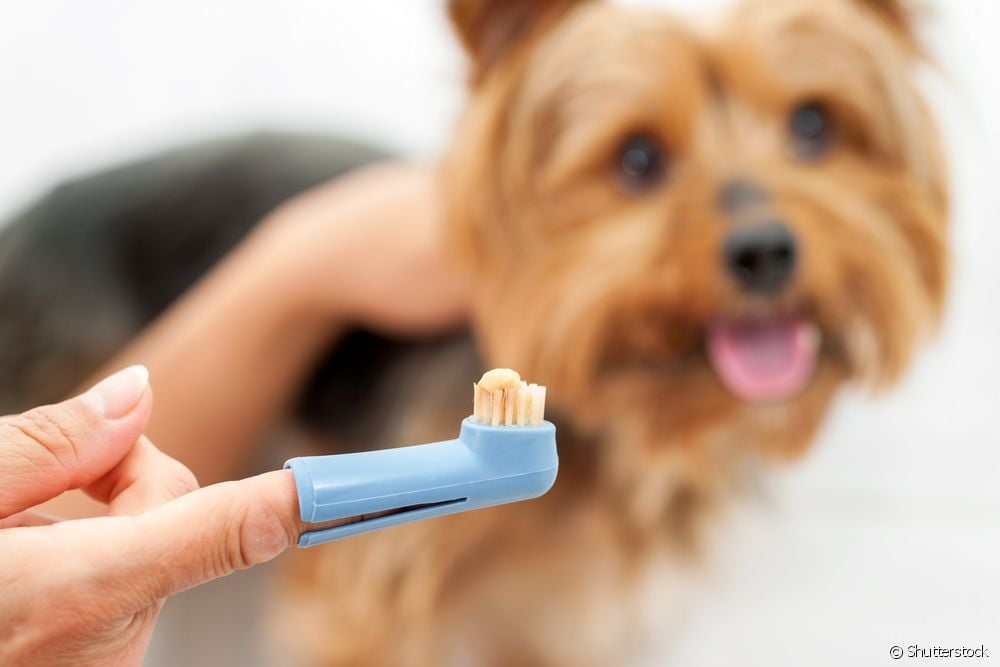What is the best toothpaste for dogs? Veterinarian answers all questions about the use of the product

Table of contents
Brushing the dog's teeth is part of the essential care for our pets. This is the best way to prevent some oral problems and, for that, two tools are indispensable: the toothbrush and the toothpaste for dogs. Together, they are able to preserve oral health and ward off undesirable situations, such as tartar. But what to take into account when it comes to cleaning the teeth?what is the best type of product? To answer all these questions, we talked to veterinarian Mariana Lage-Marques, a specialist in dentistry at USP. See what she told us!
Dog toothpaste: how to apply the product correctly?
Some people may think that the best way to apply dog toothpaste is to use their own finger, but this is not the most recommended. According to the expert, the toothbrush is an essential accessory when it comes to caring for the smile of the dogs, because it is responsible for removing all the bacterial plaque that adheres to the dog's tooth. "The removal of this plaque is done frommechanical way by the friction of the brush with the tooth, while the toothpaste ends up being an adjuvant that will assist in this brushing process ", explains Mariana.
See_also: Cat with heterochromia: what causes, relationship with deafness, care and moreEnzymatic dog toothpaste is a highly recommended option
Among the options of toothpastes for dogs available on the market, one of the most suitable is the one with enzymatic formula, which has substances that fight the formation of bacterial plaque. "Enzymatic toothpaste prevents the organization of plaque on the dog's teeth and, consequently, reduces the incidence of periodontal disease", informs the veterinarian.
Despite being a great ally of oral health, enzymatic dog toothpaste does not work alone. "There is no point in using the product without the friction of the brush on the teeth. So to have an effective result, the most suitable is to perform hygiene with the paste and the brush. If there is no mechanical removal of plaques, enzymatic dog toothpaste ends up not workingcorrectly".
Do cheaper dog toothpastes work too?
When it comes to dog toothpaste, one factor that weighs heavily is the price of the product. There are some more expensive ones and others that are cheaper, but is the result the same? According to the expert, the ideal is to use dog toothpastes with a slightly higher cost, because they usually contain enzymatic substances that slow down the formation of plaqueHowever, cheaper toothpastes also have their advantages: "As they are flavored, they end up helping to condition the animal so that the brushing process is easier, helping the dog to get used to it better on a daily basis".

So what is the best toothpaste for dogs?
Each dog toothpaste has pros and cons. To choose the best option for your friend, it is essential to talk to a veterinarian specializing in dentistry or a general practitioner first. According to Mariana, the ideal is that both the training and the conditioning of the dog are initially done by a professional. Thus, it is possible to obtain the proper guidelines so as not to make mistakes when the time comesof brushing the dog's tooth.
See_also: Pomeranian Lulu (or German Spitz): a definitive guide to this cute breed + 30 photos for you to fall in love with"Tooth brushing should be done daily, with or without toothpaste. The important thing is that there is friction of the bristles on the teeth. If this is not possible, you can use gauze or a finger, which also work well. Still, it is worth trying to evolve to a toothbrush with soft bristles to make brushing more effective ", advises the dentist.
In addition to brushing with toothpaste, dogs need follow-up with a specialist
Dogs need to visit a veterinarian who specializes in dentistry at least once a year to get a more thorough dental cleaning. Many people may think that dog tartar toothpaste is enough to eliminate this type of problem, but it is not. "Ideally, the patient should be followed up by a specialist annually. Even brushing the dog's teeth every year is not enough.There are areas that brushing cannot reach, so it is important that the specialist provides guidance and assessment to indicate when professional treatment (teeth cleaning) should be carried out."

